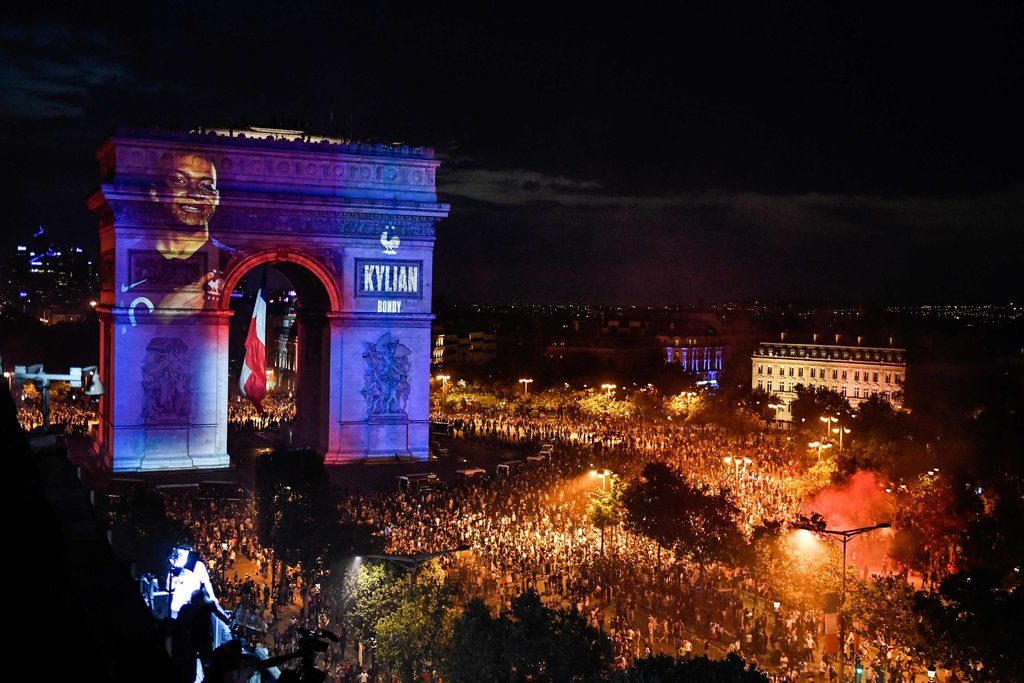By Antony J. Blinken | Contributing Opinion Writer | July 16, 2018 | NEW YORK TIMES
“I think allowing millions and millions of people to come to Europe is very, very sad,” President Trump said during his current good-will tour of the Continent. “I think you are losing your culture.”
Mr. Trump, meet Kylian Mbappé, the 19-year-old breakout star of France’s newly crowned World Cup soccer champions. The son of an Algerian mother and Cameroonian father, Mbappé is emblematic of a team of immigrants — 16 of its 23 players are from families recently arrived in France. They’ve just made an entire nation very, very glad of its diversity — at least for one day.
Brazilians, Argentines, Italians and Germans may object, but France can now lay claim to being master of the beautiful game. Over the past 20 years, France has won two of the quadrennial World Cups and placed second in a third.
France’s soccer success is global in another way. Under the rules of FIFA, international soccer’s governing group, players can suit up for countries where their parents or grandparents were born, even if they were not. Some 50 French-born players took part in this year’s World Cup. More than half wore another country’s jersey. Brazil, the next-biggest feeder country, provided 28 participants, including five to other teams. Over the past four World Cups, France has contributed more native-born players than any other country.
Vox makes a compelling case that French soccer dominance is the product of two phenomena.
First, in the decades after World War II, the French government recruited successive waves of immigrants — first from Southern and Eastern Europe and North Africa, later from West Africa, the Middle East and the Caribbean — to rebuild the country and then meet a labor shortage. By the 1970s, France had taken in more immigrants — some 2.7 million — than any other European country. Most settled in the mostly nonwhite, working-class suburbs — “les banlieues” — that ring its major cities.
Second, after a long postwar period of soccer failure, France established a national academy in the early 1970s to identify, recruit and train local youth. It put a special emphasis on hardscrabble immigrant areas around Paris, where nearly 40 percent of new arrivals take root — and where almost one-third of the members of this year’s world championship team were born, including Mbappé.
But the image also underscores the profound irony of the moment. That France now celebrates Les Bleus (as the national team is known) from the suburbs and the successful integration of immigrants into its soccer machinery cannot hide the fact that the country is in the midst of a larger integration crisis. The banlieues are rife with riots, drugs, crime and high youth unemployment. As in much of Europe, anti-immigrant sentiment is a driving force in French politics, feeding the success of the extreme right National Front party.
Mr. Macron has already tacked right on immigration, with legislation that toughens asylum rules and increases penalties for illegal immigration. Fourteen members of his own party abstained from a parliamentary vote in protest. Mr. Macron’s interior minister justified the harder line with a “better us than them” defense: “I fear that if we do not resolve the problem facing us,” the minister, Gerard Collomb, said, “others will do it without any humanity.”
The early returns are mixed. After commissioning an ambitious reform plan for the suburbs, Mr. Macron pulled back from most of its major recommendations, which would have cost $45 billion to implement. Speaking to lawmakers, community leaders, entrepreneurs and residents in May, he declared that he wouldn’t be announcing a “Marshall Plan for the suburbs” because “this strategy is as old as me.” He added, “We are at the end of what this method is able to produce.”
Critics mocked the lofty rhetoric — “a policy of emancipation and dignity,” “a philosophy of action” — and criticized the lack of specifics. But the foundation of a new approach is starting to come into focus. It includes community policing, 30,000 internships in private companies and state agencies for teenagers from disadvantaged areas, audits of the top 120 French companies to detect discrimination in hiring and, most significant of all, an emphasis on primary education and early-age literacy.
When students returned to school last September in high-priority zones — including the Paris suburb that is home to France’s national soccer stadium — they found that a government mandate had cut classroom sizes in half, from 24 students to 12 for the equivalent of first graders. The program will expand to grades two and three over the next year.
It’s a start. One new “method” Mr. Macron might consider is the approach France took to cultivate its soccer talent — a sustained, focused national effort to find, nurture, train and place future Mbappé’s in France’s newly vibrant economy. Mr. Macron has until the next World Cup — when his first term ends — to get it right.

